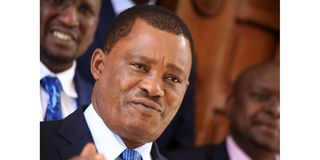Muturi set to decide on the 2 referendum Bills

National Assembly Speaker Justin Muturi addresses the media at Parliament buildings on September 22, 2020.
What you need to know:
- Mr Kioni said that, despite the disagreement, the country will soon have a referendum law.
- The JLAC proposal seeks to have county governments conduct referendums in their jurisdictions but on limited issues touching on their mandate.
National Assembly Speaker Justin Muturi will on Tuesday decide which of the two referendum Bills before the House takes precedence as the country prepares for a vote to amend the Constitution.
This comes after a six-member subcommittee formed by a joint sitting of the House committees on Justice and Legal Affairs (JLAC) and Constitution Implementation and Oversight (CIOC) failed to strike a deal on the merging of the Bills as directed by Speaker Muturi.
Kangema MP Muturi Kigano, who chairs JLAC, and his Ndaragua colleague Jeremiah Kioni, the CIOC chairman, however noted that the two committees had agreed on almost all the major issues concerning the two Bills.
“This is now a matter for the Speaker to make a ruling to guide the House as the subcommittee did not agree on which Bill takes precedence,” Mr Kigano said.
Mr Kioni said that, despite the disagreement, the country will soon have a referendum law.
“Sequencing of the two Bills is what remains but we will take one of them and move the amendments jointly using the other. That is what we have recommended in our report to the House,” Mr Kioni said. The new law seeks to fill the existing legal gaps on conducting referendums.
One million signatures
On Wednesday last week, President Uhuru Kenyatta and ODM leader Raila Odinga officially started the process of collecting at least one million signatures to change the 2010 constitution through a popular initiative when they unveiled the amended draft BBI Constitution of Kenya (Amendment) Bill 2020.
The launch of the signature collection follows the unveiling of the Building Bridges Initiative (BBI) report and the draft Constitution of Kenya (Amendment) Bill 2020 on October 21in Kisii. On November 4, Speaker Muturi directed the two committees to fast-track the harmonisation of the two Bills and table a report in the House. The two committees were to deliver their joint report early this month.
But the Speaker noted that, in the event they took long to present a joint report on the merging of the two Bills, he would guide the House appropriately over which Bill takes precedence with the other one being used for supplementation at the amendment stage. Immediately the BBI draft Bill was unveiled, President Kenyatta and Mr Odinga held a retreat in Naivasha with MPs from the Senate and National Assembly to draw up support for the proposed constitutional changes.
The Naivasha meeting led to the creation of coordination committees led by governors and MPs on the collection of the signatures. The Bill by CIOC seeks to have a referendum held together with the General Election.
BBI referendum
However, this proposal is unlikely to go down well with the proponents of the BBI led by Mr Odinga and Siaya Senator James Orengo. Mr Odinga has drawn up a roadmap showing that the BBI referendum exercise must be held by April next year to engineer the required changes ahead of the 2022 General Election.
The JLAC proposal seeks to have county governments conduct referendums in their jurisdictions but on limited issues touching on their mandate.
JLAC’s proposal, developed by the Independent Electoral and Boundaries Commission (IEBC) and shared with the committee, was brought to the House after the CIOC Bill had already been tabled. The CIOC took the opportunity to generate its Bill after JLAC dragged its feet in fast-tracking the IEBC draft Bill.
“The principal object of this bill is to consolidate the law relating to conduct of referendums, to provide for a transparent and fair process in order to obtain a clear expression of the will of people” the Bill says. A county referendum, the Bill states, will be confined to local issues that consist of county laws and petitions, or “planning and investment decisions affecting the county.”





